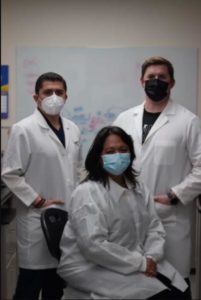Gene changes caused by SARS-CoV-2 spike proteins provide a potential answer for what causes long-haul COVID-19, Texas researchers find
As COVID-19 vaccines become widely available and cases of COVID-19 in the United States begin to drop, the medical community is beginning to focus more on the long-term effects of COVID-19. Sometimes called “long-haul COVID-19,” the varied and long-term effects that a SARS-CoV-2 infection can create are just starting to be understood (See Long-Haul COVID-19 Emerges as a Concern, Potentially Increasing Need for More COVID-19 Antibody Testing).
New research out of Texas Tech University provides a possible explanation for why these symptoms occur. Led by Sharilyn Almodovar, PhD, at the Texas Tech University Health Sciences Center, researchers found that exposing airway cells to the spike protein of the SARS-CoV-2 virus caused genetic changes.
Potential Impact of Exposure to SARS-CoV-2 Spike Protein Alone
“We found that exposure to the SARS-CoV-2 spike protein alone was enough to change baseline gene expression in airway cells,” said Nicholas Evans, a master’s student at the Texas Tech University Health Sciences Center and one of the researchers involved in the study. “This suggests that symptoms seen in patients may initially result from the spike protein interacting with the cells directly.”
This finding that changes in gene expression occur with exposure to the spike protein of SARS-CoV-2 provides a possible explanation of what causes the mysterious, unexplainable symptoms of long-haul COVID-19 that vary from patient to patient. Changes in gene expression can have different effects on different patients, depending on their genetic makeup and their exposure to the virus.
“Our work helps to elucidate changes occurring in patients on the genetic level, which could eventually provide insight into which treatments would work best for specific patients,” says Evans.

Research May Eventually Lead to Clues About Unexplained Illnesses
While the scientific community’s understanding of long-haul COVID-19 is still quite nascent, Almodovar’s team’s findings are one of the first findings in studying long-haul COVID-19 that provide a good explanation for what could potentially be the cause of these symptoms. This new research will undoubtedly lead to further research examining more in-depth which genes are affected and to what extent this impacts different individuals. These findings may also have implications for other previously unexplained illnesses, such as the long-term effects of Lyme disease.
One interesting result of the these findings is that they may explain why some people with long-haul COVID-19 symptoms have relief of their symptoms after getting vaccinated against COVID-19. Authorized COVID-19 vaccines are designed to use human cells to manufacture spike proteins and stimulate immunity. The finding that the spike protein of SARS-CoV-2 may cause long-haul COVID-19 symptoms could explain how vaccines that artificially create a form of the spike protein could cause these symptoms to change.
COVID-19 Vaccine Questions, Further Studies
Another question that this finding raises is if COVID-19 vaccines, which artificially create SARS-CoV-2 spike proteins, could also stimulate changes in gene expression, causing symptoms that mimic long-haul COVID-19 symptoms.
While Almodovar’s team’s research is only the beginning of study into the possibility of gene expression changes driving long-haul COVID-19 symptoms, it may become a foundational concept in this area of research.
Understanding the implications and effects of long-haul COVID-19 will be important for clinical laboratories that provide COVID-19 antibody testing. As the medical community’s understanding of long-haul COVID-19 increases, it may not only increase the demand for serology tests but may also create a demand for other related tests, particularly immunologically-related tests.
Clinical laboratories will benefit from keeping abreast of long-haul COVID-19 related research and being aware of developments that affect how testing will support clinical treatments and outcomes.

—By Caleb Williams, Editor, STAT Intelligence Briefings
Related Resources:
Experimental Biology: Gene changes might explain long-haul COVID-19 symptoms
NPR: Mysterious Ailment, Mysterious Relief: Vaccines Help Some COVID Long-Haulers






